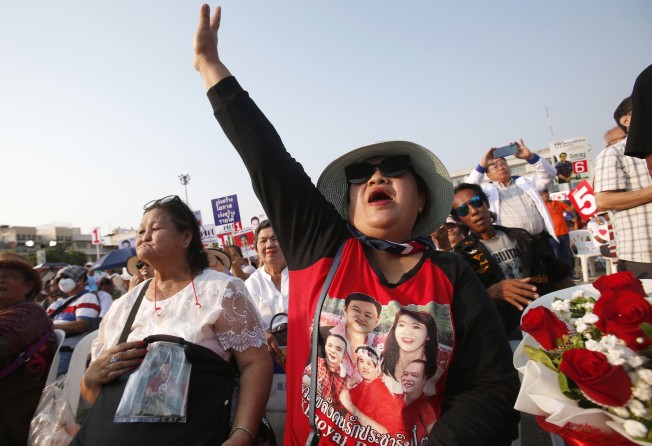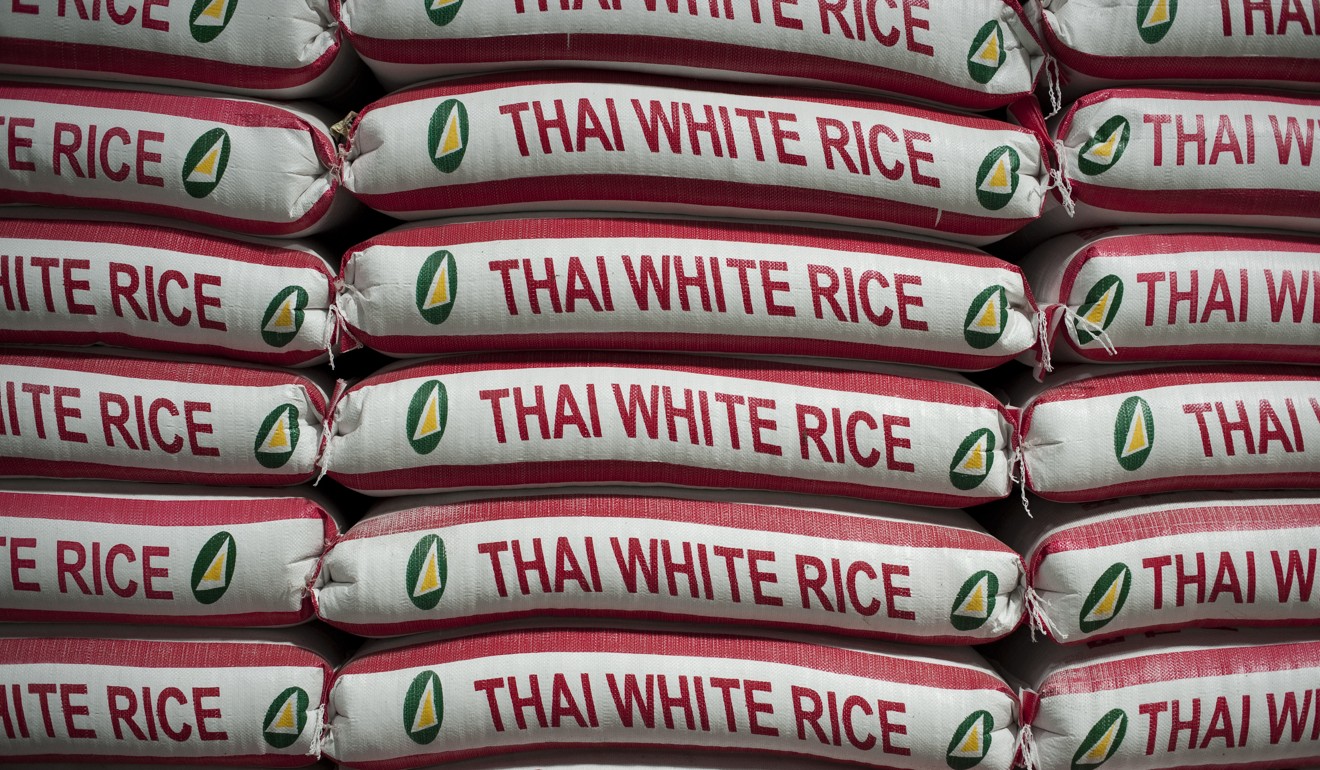Thailand delays rice bill due to farmers’ objections. Will it open the door for the Shinawatras?
- March 24 elections will be the first since 2011, heralding a return to democracy after a military junta took power in 2014
- Support in Thailand’s rural northeast was central to Shinawatras’ electoral success, relying heavily on subsidies to rice farmers

Rice is once again at the centre of Thai politics after a controversial bill was postponed indefinitely due to opposition from farmers who make up one of the country’s most influential voting blocs.
The proposed rice bill would have established a board controlled by the government to oversee the industry, granting the state sole authority to license certain strains of rice seeds for sale.
The bill passed the first reading in the National Legislative Assembly (NLA) in January but was postponed last week due to growing opposition from rice farmers who claim it would exclusively benefit large-scale producers by banning the distribution of rice seeds not approved by the proposed new board. The bill will be reconsidered after elections on March 24.
“It has been a miscalculation of the timing and the political consequences,” said Thanapan Laiprakobsup, a researcher on rice policies in Thailand at Chulalongkorn University, who noted farmers, millers and exporters found rare common cause in opposing the bill.
“[The military junta] didn’t think there would be such a big opposition … but this time all the stakeholders [except the big corporations] agreed in opposing. The rice industry wants assistance but not direct intervention.”
The March 24 elections will be the first since 2011, heralding a return to democracy after a military junta took power in 2014.
However, the junta has its own proxy, the Phalang Pracharat Party, which has nominated Prime Minister Prayuth Chan-ocha, the now-retired general who led the 2014 coup, to retain the top job. The opposition to the rice bill could hurt his chances, though, Thanapan said.
The Phalang Pracharat Party has condemned the bill and proposed a subsidy if they win the elections but rural voters could punish them anyway, given Prayuth’s highly visible association with the party and the junta’s support for the unpopular bill.
“Rice farmers think that Phalang Pracharat Party is equal to Prayuth … And they are sending signals of political dissatisfaction especially to [him],” Thanapan said.
On the other hand, the postponement of the bill could benefit the Pheu Thai Party, a proxy for former prime minister Thaksin Shinawatra, who was elected in 2001 before being forced from office by a coup in 2006.
Thaksin’s sister, Yingluck, later served as prime minister from 2011-14, but she was also forced from office by a coup, which installed the current military government.

Support in Thailand’s rural northeast was central to the Shinawatras’ electoral success, relying heavily on government subsidies to rice farmers, who in turn formed the backbone of the Shinawatras’ populist “red shirt” movement, which clashed repeatedly with the anti-Thaksin, pro-monarchy “yellow shirts”.
The latest controversy over rice policy could create an opportunity for the Pheu Thai Party to reinforce their appeal to these rural voters that delivered the Shinawatras’ previous victories.
Thailand is the world’s second-largest rice exporter after India, and the second-largest exporter to China after Vietnam. However, the Thai Rice Exporters Association has forecast a 14 per cent drop in 2019 from 2018.
Proponents of the rice bill claim it would give the government a stronger hand to support the rice industry and expand export markets.
Thailand has a long history of rice market interventions. Indeed, government rice subsidies were a major factor in the coup that deposed Yingluck in 2014, after her government committed to buying every grain of rice at inflated prices.
The disastrous scheme cost the government US$8 billion, according to the military junta, and Thailand lost its status as the world’s largest rice exporter as a result.
It was cited by the military as one of the main justifications for its intervention and Yingluck was subsequently sentenced in absentia to five years in prison.
“Rice farmers and their families were among the largest groups that could be reached through a single policy intervention,” said Jacob Ricks, assistant professor of political science at the Singapore Management University. “Farmers and their families still make up over 30 per cent of Thai voters, so they will continue to be important.”

Accordingly, the junta has approved its own short-term loans and cash handouts for rice farmers.
“The military regime has also tried to win farmers over with a series of policies, although they have met with limited success in convincing farmers,” Ricks said.
Witoon Lianchamroon is the director of Biodiversity Sustainable Agriculture Food Sovereignty
Action Thailand (Biothai), a farmers’ rights advocacy group. He said the military government had sought to increase its control over the kinds of rice able to be grown and traded.
It has been a miscalculation of the timing and the political consequences
“[If approved], we estimate that in the near future only a few varieties will remain, [and they will be] controlled by the government and the private sector,” he said.
Witoon said the bill was designed to promote trade regardless of the interest of farmers to preserve diversity and improve their seeds.
“Some varieties that are more nutritious might be lost,” he said, adding that the bill would discourage farmers from cultivating and improving certain strains of rice because registering them would be “very difficult for farmers”.
According to Thanapan, farmers were concerned that greater control exercised by the state would have benefited larger firms at their expense.
“It meant that the state was not going to help the farmers … and that they would give power to agricultural business to monopolise the rice variety market,” Thanapan said.
In turn, the fact the bill was postponed has once again underlined the political influence wielded by the country’s rice farmers, even under a military government.
“The new rice bill failed to convince farmers of any benefits,” Ricks said. “Even supporters of the regime found it hard to swallow. This shows the importance of farmers as a constituency. Even an insulated military regime couldn’t pass the new rice bill with the threat of a farmer protest.”